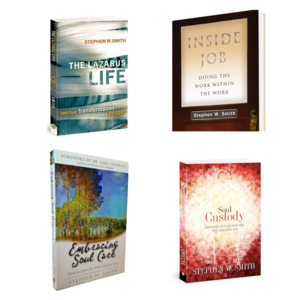By Stephen W. Smith
In the 4th century AD, Gregory of Nyssa wrote these words, “Sin is the refusal to grow.” Often we think of sin as things we do or acts we commit or omit that get us into trouble in our spiritual life. But I’m so thankful to discover Gregory of Nyssa’s remarkable words: “Sin is the refusal to grow.” It makes a lot of sense to me to believe that to not grow or to choose to not keep growing is a huge mistake.
To stay the same; to remain fixed in our dogmas can be a detriment to our spiritual health and vitality. We were created to grow, not just physically but emotionally and in all things spiritual. All education is the effort to grow our minds and hearts into a fuller understanding of the truth. It may be as simple as this, the truth does not change but our understanding of the truth must change as we grow, mature and age. What is true is this, the spiritual life is a journey—a journey where we awaken time and time again to deeper understanding.
Jesus’ own teaching focuses on growth and change. We don’t remain the same—thank God for that. From a small seed, something grows. From a vine planted and tended to, we experience fruit. Something happens that is about God’s work in us and through us. We grow and as a result our growth causes a ripple effect to happen. Growth and change in me, results in greater change around me. This is how the one solitary life of Jesus grew to now flow into our life today.
For many of us, myself included, growth has been about unlearning some things. I was taught some things that I have had to let go of. Many of us have had to unlearn our image of God when we were shaped by unhealthy voices and personalities that actually thwarted a fuller understanding of God. I’ll never forget working with Mike. Mike had to unlearn his understanding of God. When I asked Mike what images of God did he have in his mind? Mike responded, “I believe that God is mad as hell at me. He’s angry. Distant and he’s hurt me a lot.” It took time, grace and truth to untether the images that Mike had accumulated about the God who really is—not the God he has made up in his mind about who God is.
I know this is true for me in my understanding of what it means to be in love and what it means to be married. When I first married in 1980, I was young, naive and inexperienced. The school of hard knocks, experiencing brokenness, diagnosis with cancer and the death of my parents and now a grandchild, offered me insight into platitudes that I only said I knew something about. Finding in Gwen a woman who offered me grace, love and acceptance radically altered my view of marriage but also my view of love.
My soul has to grow just as the Apostle Peter encouraged us to grow our souls. Peter writes, “Like newborn infants, long for the pure spiritual milk, that by it you may grow up into salvation”— (I Peter 2:2, ESV). We are to grow. We are to grow up. We all need to grow and we all need to grow up into a better version of ourselves—a version God intended for us to become. We do this by growing. We do this by finding what is more pure, less polluted, more nourishing. We do this by laying down some things, benchmarks or ideas because we see a greater truth; have a greater insight; or have an incredible moment of epiphany through a teacher, experience or voice that helps us keep growing.
Some of us began our spiritual journey in churches and traditions that gave us a beginning, but somewhere along the way, we expanded our thinking or our understanding of the truth morphed like a caterpillar into a beautiful butterfly. The truth set us free in some ways—hopefully in many ways. That’s what real truth does that helps us grow. We find inner freedom. We need more freedom. We find God. Some of us have found health and growth by growing strong. While others of us have zig-zagged our way to more health and truth. By zig-zagged, I mean we try what we can glean from this and then keep moving forward.
Dr. David Benner writes and explains for us his own growth as a human being going through several stages or seasons in his spiritual life that eventually changed. Benner writes:
All the parts of your journey must be woven together if you are to transcend your present organization and level of consciousness. For myself, the great challenge was re-embracing traditions that I have grown beyond and that offered—even at the time—an oppressively small worldview. I did not want to be an ex-evangelical or an ex-fundamentalist. Too many people live that life of dis-identification, and I did not want to share their anger and “stuckness.” It was essential, therefore, for me to identify and embrace the gifts that had come to me from these traditions. This was the way in which I came to know that everything in my life belongs, that every part of my story has made important contributions to who I am. And the same is true for you.[1]
Benner’s words have offered to me, some signposts of my own growth and metamorphosis. What makes us whole? What makes us really grow? These are the questions we need to be asking ourselves and others. Rather than become bitter, angry or stuck, Benner encourages us to take the best of some of the ways we’ve journeyed; give thanks and keep growing. As you think through the chapters and seasons of your own spiritual journey, what can you give thanks for in each important season or stage of your growth?
Perhaps the most important way I have grown, as I look back on my spiritual life, is to listen to voices and read authors that are outside of my own tradition. Since I was born into and raised a Baptist, I felt the need early in my spiritual journey to read what other people were saying and thinking on the same subject. These important voices helped shaped my thinking in a wider way than from just one perspective. I began to read Anglicans, Catholics, and other voices from people who did not share my story of being born in the south; born to Protestants parents and who were more accepting of tradition than I was at the time.
Gwen and I will never forget the first time I asked her to read a book by Catholic author Henri Nouwen. I had been so amazed at his insight and ability to explain some truths that were elusive to me for years. We sat in our bed and read one of his books and both wept at the beauty in which he described a simple truth of being loved by God. He found words that had eluded us for years. His words, while not in our own tradition unlocked some closed doors for us to explore.
Soul Care is always about growth. As we learn to care for our souls, we learn to look both back and forward to find greater truth; greater health and deeper maturity.
I hope that you will make it a goal in the New Year to Grow Your Soul.
Here are some suggestions for you to grow your soul:
1. Consider enrolling in the Potter’s Inn Soul Care Institute. This is our two year program to help you grow and deepen your soul. We’re launching new cohorts in North Carolina, Michigan and Colorado. The time to consider this is now as space is limited and at present some scholarships may be available. I know of no greater way to grow than to enroll and begin this deeper journey.
2. Read a book outside your own tradition and understanding. You don’t have to agree with them but perhaps their thinking will motivate you to decide what you really believe about something like life after death, prayer or the soul. Consider my list of recommended books.
3. In 2019, attend a retreat to help you grow your soul. Find something pertinent to your interest and ask a friend to go with you. We are finding at Potter’s Inn that more and more people find us by simply googling, “spiritual retreats.” For sure, consider attending our retreats in the New Year. Keep checking the website for new details of offerings.
4. In the New Year, choose to do work with a spiritual director—someone trained in listening and being a spiritual companion with you. Develop a safe place to ask the hard questions where you will not be judged or shamed. Find the healing power of love and how love really does transform us.
5. Take 10 minutes a day in the New Year to choose to be completely quiet and completely still. Don’t equate this time for reading or with your quiet time. Silence is the furnace of transformation and in a loud and chaotic world such as is ours today, allow silence to do what only silence can do: center us and simply us—distilling our soul to the essentials in life and faith.
[1]David G. Benner, Human Being and Becoming: Living the Adventure of Life and Love(Brazos Press: 2016), 118-119.





